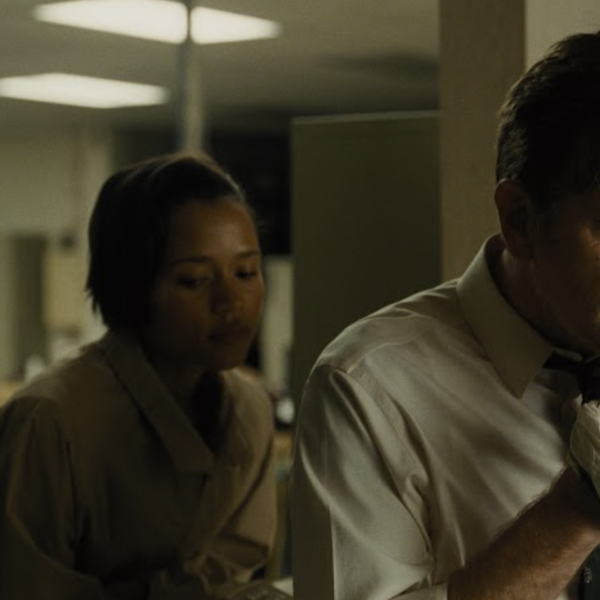Everyone knows that Chilean dictator Augusto Pinochet died in December 2006 at the age of 91, more than 30 years after he seized power from Salvador Allende in a coup d’état that was followed by censorship, torture, mass internments, and forced disappearances at the pleasure of an unelected regime that drained the country of its lifeblood for generations to come. What Pablo Larraín’s cheeky and grotesque “El Conde” (or “The Count”) presupposes is… what if he didn’t?
Directly addressing a figure whose dark shadow has fringed some of the director’s previous work (specifically “No,” “Post Mortem,” and “Tony Manero”), this fanged satire about the persistence of evil imagines that Pinochet is still alive and kicking. Or, more accurately: undead and loathing it. In Larraín’s conception, Pinochet is a 250-year-old vampire who first developed his lust for blood during the French Revolution, during which he so fetishized Marie Antoinette’s indifference towards the common man that he stole the queen’s head and licked the blood off the guillotine that was used to lop it off. From that point on, he traveled the world and fed off oppression wherever he could find it, eventually settling in Chile — “a country without a king” — when the time came to orchestrate his own suffering.
Ice-cold and darkly funny (with the lion’s share of the film’s humor stemming from its cruelty), “El Conde” is heavy on premise and light on plot. This is the kind of high-concept history play that squeezes as much from a single idea as it can; the kind of wild and spirited “what if?” that invariably takes more pleasure in laying the foundation of its story than it does in layering anything of substance on top of it. Stuff happens, particularly once the Catholic Church dispatches a nubile young nun (Paula Luchsinger) to Pinochet’s isolated ranch — part sheepherder’s estate and part Hitler-esque bunker — to drive a stake through the heart of Chile’s greatest monster, but the brunt of the movie focuses on the former dictator as he mopes around the house and laments his own immortality. As Dracula famously sang in “Forgetting Sarah Marshall”: “Die, die, die… I can’t.”
Set in 2023 but shot by Ed Lachman in a lustrously timeless black-and-white that reflects both Pinochet’s deathlessness as well as his denial, “El Conde” suggests that it’s hard to live in a world where the history books already hate you. By the time it begins, Pinochet has lost the will to outwait our collective memory of him — a fact that sickens the film’s sympathetic narrator, whose identity, revealed with gusto during the third act, is as obvious from the start as it remains amusingly bleak at the end.
Played by Larraín regular Jaime Vadell, an 87-year-old actor whose spry performance immaculately splits the difference between a decrepit old man who relies on his walker and a dangerous ghoul who can still get it up for a piece of warm flesh (“I’ll ride you like a bandit’s horse!” he shouts to his self-interested wife Lucía, played by Gloria Münchmeyer, across a country dining room), Pinochet spends his days grumbling to anyone who will listen about the injustices he’s suffered since leaving office. He’s fine being remembered as a killer, but he can’t abide the fact that people think of him as a thief.
In fact, the proud fascist is so fed up with the bullshit that he’s lost his appetite for drinking people dry, which explains why his body has become a shriveled husk over the last few months. He can’t be arsed to soar around Santiago like some kind of evil Superman and eat the city’s workers and young progressives, anymore, and he doesn’t seem to care that his loyal butler Fyodor (Alfredo Castro) is carrying on with his wife.
When his five adult children show up at the house en masse in order to claim their inheritance, Pinochet hardly bats an eye at the irony that his own brood — all of whom he refuses to bite — have turned into vampires all the same. Larraín and Guillermo Calderón’s script is all too happy to pick up that slack, as “El Conde” relishes a feast’s worth of attention on a spare rib’s worth of seriocomic observation, its characters far too undefined to support the “Succession”-like subplot in which Pinochet’s kids bicker over the keys to their father’s Aspen chalet and how best to divide money from the bank accounts that funded 9/11 (a date that has a different, if similarly tragic, connotation in Chile).
Larraín is eager to mine some mordant humor from how lightly Pinochet was let off the hook for his crimes against humanity, but the dictator’s ultra-entitled offspring prove insufficient avatars for the point he’s making about the hidden costs of allowing evil to elude justice. As you might expect from a satire in which Pinochet keeps the hearts of his fellow Chileans in his kitchen freezer as a midnight snack, “El Conde” isn’t big on subtlety (Lachman’s rich cinematography offers the film its only shades of gray), and so it feels like a missed opportunity that Larraín didn’t squeeze more juice from the all-too-relevant fact that deposing a fascist from power isn’t the same as defeating them.
Of course, that notion is the most basic seed of a Pinochet film set more than a decade after its subject actually died, but “El Conde” — for all the windswept beauty of its barren locations, and the Grimm detail of its interior production design — is too housebound for its evil to blossom any wider than a wry smile. The movie often seems like a self-parody of Larraín’s similarly cloistered “Jackie” and “Spencer,” down to its suffocating gorgeousness and baroque score (Juan Pablo Ávalo and Marisol García stand in for Mica Levi and Jonny Greenwood).
As a meditation on the eternal nature of monstrousness, “El Conde” only truly comes alive through Pinochet’s will they/won’t they flirtation with the young nun Carmencita, who arrives at the ranch disguised as an accountant — a comic disguise made all the less convincing by the religious ecstasy the girl brings to her mission. Plastered with glassy-eyed devotion and framed in rapturous close-ups that evoke the way Dreyer shot Renée Jeanne Falconetti in “The Passion of Joan of Arc,” Luchsingers’ savvy performance makes it hard to tell if her character is high on the chance of exorcizing the world of Pinochet’s evil, or if she’s on the brink of being seduced by it (the latter possibility illustrated through a transcendent sequence that makes full use of the Patagonian landscape).
That pendulum swings both ways, as “El Conde” — in its own twisted way — eventually begins to flirt with the idea that Pinochet’s lust for Carmencita might inspire him to atone for his sins, or at least to commit some unexpected new ones (“There’s nothing more gruesome than watching a man fall in love,” the narrator scoffs). But this isn’t a film about humanizing a monster, and it never really pretends to be. On the contrary, Larraín is more compelled by the human tendency to deny monstrousness as soon as something less terrifying comes along to distract us from it; our tendency to think that we’ve learned our lesson, fortified our defenses, and grown too civilized to fall prey to the same kind of evil all over again. Its teeth may not be sharp enough to break the skin, but the silly-smart “El Conde” is right to recognize that history is never fair, and often terribly foolish.
Grade: B-
“El Conde” premiered in Competition at the 2023 Venice Film Festival. It will open in select theaters on Friday, September 8, and available to stream on Netflix starting Friday, September 15.


